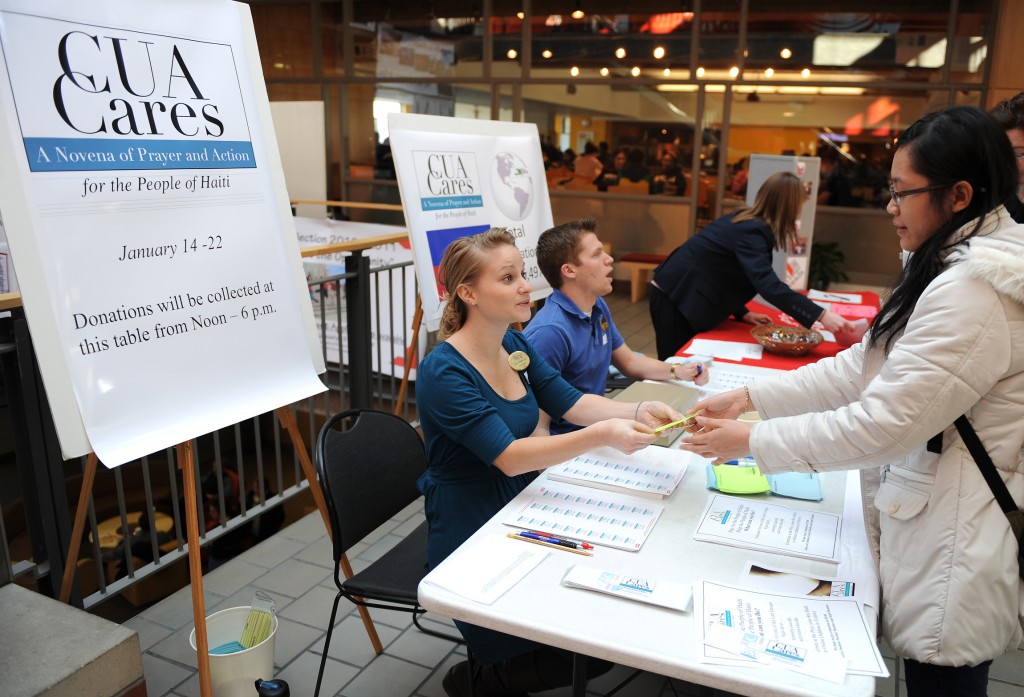
John Garvey, president of The Catholic University of America in Washington, said one of the biggest changes facing Catholic higher education is the rise in secularism in society coinciding with the decline of Catholic culture in America. PHOTO: CNS/Ed Pfueller, The Catholic University of America
By Katie Bahr
John Garvey, president of The Catholic University of America in Washington, told a group of Catholic journalists Nov. 7 that Catholic education should not be taken for granted.
“Catholic education is a gift we will have to work hard to preserve,” Garvey said. “The past several decades have seen changes that pose a serious threat to its integrity,” he told Catholic journalists and other media professionals at the Catholic Press Association’s Southern and Eastern regional meeting in the Washington suburb of Alexandria.
He said one of the biggest changes facing Catholic higher education is the rise in secularism in society coinciding with the decline of Catholic culture in America. He said this problem seemed unthinkable when he was growing up in an Irish Catholic family in a small steel town in Pennsylvania.
“When I grew up, being Irish and being Catholic were connected,” he said. “From my father we learned a fervent devotion to the Blessed Mother. We prayed the rosary often. … There was a rhythm of life that went with being raised in an Irish Catholic home.”
Today, he pointed out, fewer people are getting married, more people are getting divorced and strong Catholic families are increasingly rare. Attendance has dropped at Catholic elementary and high schools, leaving children less connected to their faith, he said, and less likely to enroll in a Catholic college or university when they get older.
With the rise in a secular culture that often promotes materialism and sexual promiscuity, Garvey believes Catholic colleges and universities offer students a “coherent moral code.”
“We teach people about the life of virtue and we try to show them how to live it. We encourage people to believe that love is real and that commitment to loving others is the true path to happiness,” Garvey said, adding that “we have found that students are attracted to what we have to offer.”
Another challenge he said Catholic colleges and universities face is the dwindling vocation numbers. With fewer priests and religious available to minister students and lead by example, he said it becomes increasingly important to hire staff and faculty members who are committed to their Catholic faith.
He said faculty members “play the central role in forming the minds of students, and in guiding them in the dialogue of faith and reason.”
“How students approach the relationship of faith to the subjects they study depends on how faculty members treat that relationship,” he added.
Garvey also pointed out that today’s Catholic colleges and universities face religious liberty threats from government regulations that require schools to provide contraceptives, abortifacients and sterilizations through their health insurance plans.
“Cases like the HHS mandate suggest an unsettling trend toward the privatization of religion on a number of fronts,” Garvey said. “Religion can’t be reduced to worship or to what we do in private. … Our moral and political opinions are formed by the faith and are inseparable from it. To say we have to check our faith at the door is to exclude us from the public sphere.”
Other problems before Catholic colleges involve federal college funding, possible tax changes surrounding charitable deductions and an increased dependence on governmental support for institutions of higher education.
Despite these challenges, Garvey said there are also hopeful signs for the future, most notably, the passionate and faith-filled students.
In the end, he said, the future of Catholic colleges and universities “depends more on people who are attending the schools than the people running them.” – CNS